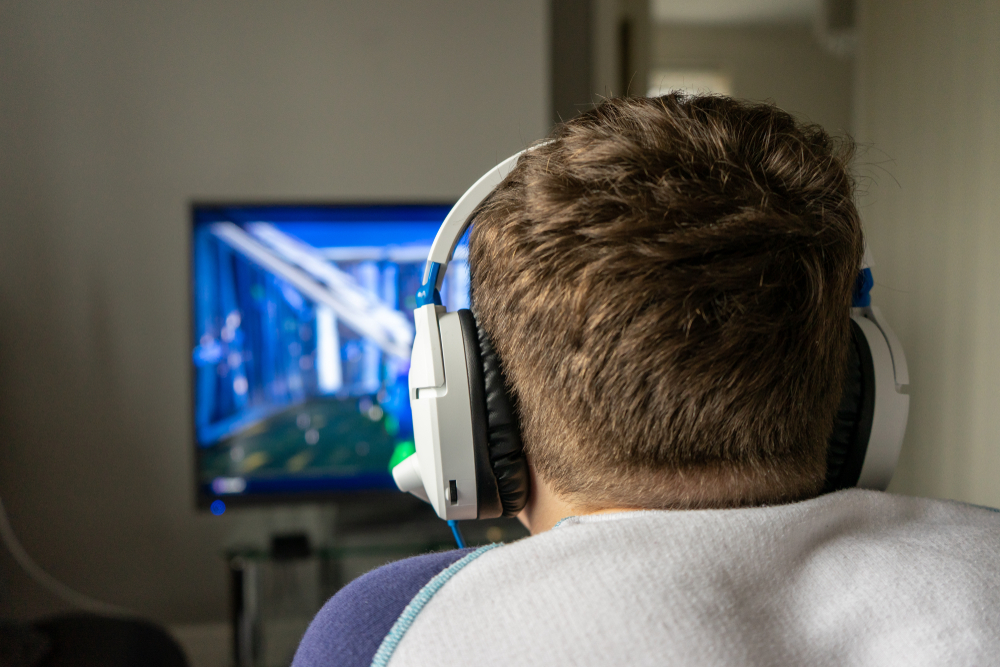Concerns about technology addiction long predate the digital flat screen: it was 1977 when Marie Winn published the first edition of The Plug-In Drug: Television, Children, and the Family (rewritten in 2002 as The Plug-In Drug: Television, Computers, and Family Life). But nowadays, technology’s potential for abuse is all but unlimited: anyone can carry full internet access in a pocket, and many people spend over a third of their screen time trying to pay attention to multiple screens. Some researchers believe that 85 percent of the population are at least occasional over-users of technology.
One popular use of technology is to play video games, which these days are beloved by children and seniors alike. But it’s still the younger players who get the most attention—and the most concern, as their brains and social habits are still developing and at risk of being stunted by a one-sided approach to life.
Symptoms of Video Game Addiction
The possibility of being literally “addicted” to video games, as one might be addicted to alcohol, may sound ridiculous to the average person—but not to the parent whose child, deprived of game access, is exhibiting behavior for which “withdrawal symptoms” seems the only description. And the World Health Organization officially recognizes “gaming disorder” as an illness.
Playing video games all afternoon doesn’t necessarily indicate addiction. If you don’t naturally take to the same activity, it’s easy to worry if your child is spending too much time on it for your taste. But that may be simply a matter of individual inclinations.
However, a child or teenager who exhibits several of the following symptoms may have gaming disorder:
- Neglecting schoolwork, old hobbies, old friends, and even sleep for more game time
- Regularly playing “a few minutes” that stretch into hours—and being visibly startled on discovering how much time has passed
- Spending six or more hours a day, every day, in gaming
- Changes in personality during or after a gaming period
- Extreme defensiveness when asked to turn off the games
- Becoming agitated when out of sight of a screen
- Sulking or throwing tantrums over lack of a convenient wireless signal
- Sneaking extra game time while allegedly doing something else
- Chronically sore wrists, back, or eyes (from too much manipulating/sitting/staring)
- Complaining that “I want to spend less time on games, but I just can’t stop”
What to Do About Gaming Addiction
If you believe your child has a video game addiction, don’t open the subject by announcing a partial or total ban on gaming: that just invites a battle both parties are doomed to lose one way or another. Start by asking a few non-accusatory questions about what your child gets from video games, and whether he or she has personal concerns about overdoing the games. Voice your own concerns objectively. If you have to invoke head-of-household authority, do it with empathy rather than harshness.
Even if your child agrees that the video gaming is out of control, don’t expect promises and good intentions to solve the problem. A true addiction requires professional treatment, so be ready to get your child into counseling—and also yourself and the rest of the family, because healing from addiction is always a team effort.
For long-term recovery, the whole household will need strict limits on technology use. It may hurt to reduce your own computer or video-game time, but it’s important for minimizing relapse temptations—and for helping the child with the addiction feel supported and understood, rather than being the “weak one” singled out for humiliating restrictions.
- Set a family agreement on which games can be played, when, and for how long. Hold each other accountable for sticking to the rules.
- Keep a firm rule against gaming during other activities, in-person or virtual.
- Confine game consoles to communal rooms (kids with consoles in their bedrooms log more than triple the play time).
- Consider programming all computers to “lock down” during certain hours.
- When everyone retires, put smartphones to bed in a different room. (Use a landline or apps-free phone for legitimate wee-hours emergencies.)
- Require that everyone get the whole family’s permission beforedownloading any new video games.
- Find ways to make life worthwhile in the three-dimensional world. With the recovering gamer especially, but also with the rest of the family, consider each individual’s natural skills and passions. Actively seek opportunities to use these. People who are accomplishing meaningful things in real life rarely feel much need to turn to video games for vicarious accomplishment.
Help in Breaking Technology Addictions
Pine Grove Behavioral Health & Addiction Services has outpatient treatment for teenagers struggling with dependence on video games and other technology. To get your kids started on reclaiming their real lives, or to learn more about this and our other addiction-treatment programs, contact us today.

